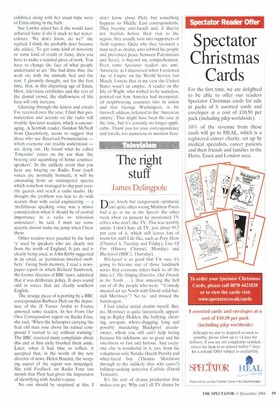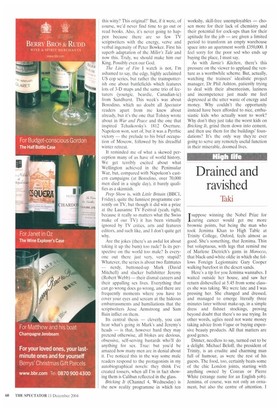The right stuff
James Delingpole
-near, lovely hut dangerously optimistic
and quite often wrong Matthew Parris had a go at rite in the Speccie the other week when en passant he mentioned TV critics who don't like TV. This was terribly unfair. I don't hate all TV, just about 99.5 per cent of it, which still leaves lots of room for stuff I do like, such as Peep Show (Channel 4, Tuesday and Friday), Line Of Fire (History Channel, Monday) and Blackpool (BBC!, Thursday).
Blackpool is so good that I'm sure it's going to become one of those landmark series that everyone refers back to all the time (cf. The Singing Detective, Our Friends in the North . . . ), thus annoying the hell out of all the people who went, '"Comedy musical set up North with David solid-butdull Morrissey"? No ta,' and missed the bandwagon.
I had similar initial doubts myself. But, no, Morrissey is quite fantastically appealing as Ripley Holden, the bullying, cheating, arrogant, whore-shagging, lying and possibly murdering Blackpool arcadeowner, whom you still can't help loving because his sideburns are so great and his one-liners so fast and furious. And everyone else is wonderful in it, too, from his voluptuous wife Natalie (Sarah Parish) and whey-faced boy (Thomas Morrison) through to the unlikely (but who cares?) lollipop-sucking detective Carlisle (David Tennant).
It's the sort of drama production that makes you go, 'Why can't all TV drama be this witty? This original?' But, if it were, of course, we'd never find time to go out or read books. Also, it's never going to happen because there are so few TV scriptwriters with the energy, verve and verbal ingenuity of Peter Bowker. First his superb adaptation of the Miller's Tale and now this. Truly, we should make him our King. Possibly even our God.
The Line of Fire I watch is not, I'm ashamed to say, the edgy, highly acclaimed US cop series, but rather the trainspotterish one about battlefields which features lots of 3-D maps and the same trio of lecturers (youngie, beardie, Canadian-ie) from Sandhurst. This week's was about Borodino, which no doubt all Spectator readers apart from me knew about already, but it's the one that Tolstoy wrote about in War and Peace and the one that inspired Tchaikovsky's 1812 Overture. Napoleon won, sort of, but it was a Pyrrhic victory — the prelude to his brief occupation of Moscow, followed by his dreadful winter retreat.
It reminded me of what a skewed perception many of us have of world history. We get terribly excited about what Wellington achieved in the Peninsular War, but, compared with Napoleon's eastern campaigns (at Borodino, over 70,000 men died in a single day), it barely qualifies as a skirmish.
Peep Show is, with Little Britain (BBC1, Friday), quite the funniest programme currently on TV, but though it did win a prize at the Lausanne TV Festival (yeah, right, because it really so matters what the Swiss make of our TV) it has been virtually ignored by TV critics, arts and features editors, and such like, and I don't quite get why.
Are the jokes (there's an awful lot about taking it up the bum) too rude? Is its perspective on the world too male? Is everyone out there just very, very stupid? Whatever, the series is about two flatmates — nerdy, buttoned-up Mark (David Mitchell) and slacker bullshitter Jeremy (Robert Webb) — their dismal careers and their appalling sex lives. Everything that can go wrong does go wrong, and there are frequently moments where you have to cover your eyes and scream at the hideous embarrassments and humiliations that the scriptwriters Jesse Armstrong and Sam Bain inflict on them.
Its central thesis — cleverly, you can hear what's going in Mark's and Jeremy's heads — is that, however hard they may pretend otherwise, all blokes are devious, obsessive, self-serving bastards who'll do anything for sex. True: but you'd be amazed how many men are in denial about it. I've noticed this in the way some male readers respond to the protagonists in my autobiographical novels: they think I've created tossers, when all I'm in fact showing them is Caliban reflected in the glass.
Bricking It (Channel 4, Wednesday) is the new reality programme in which ten workshy, skill-free unemployables — chosen more for their lack of chemistry and their potential for cock-ups than for their aptitude for the job — are given a limited period to transform an empty warehouse space into an apartment worth £350,000. I feel sorry for the poor sod who ends up buying the place, I must say.
As with Jamie's Kitchen, there's this pressure on the viewer to applaud the venture as a worthwhile scheme. But, actually, watching the trainees' idealistic project manager, Dr Phil Ashton, patiently trying to deal with their absenteeism, laziness and incompetence just made me feel depressed at the utter waste of energy and money. Why couldn't the opportunity instead have been afforded to nice, enthusiastic kids who actually want to work? Why don't they just take the worst kids on Bricking it, grind them down into cement, and then use them for the buildings' foundations? It's the only way they're ever going to serve any remotely useful function in their miserable, doomed lives.











































































 Previous page
Previous page